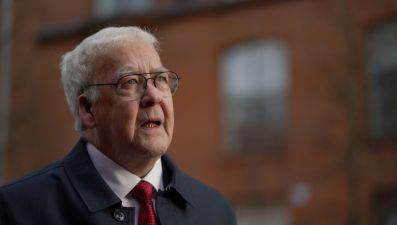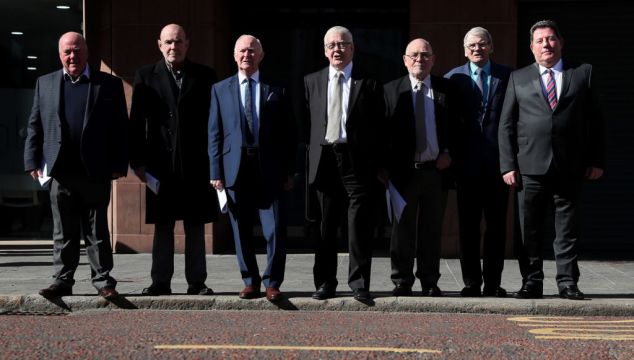Police in the North have issued an apology to a group known as the hooded men who were subjected to controversial interrogation techniques in the 1970s.
It comes after the UK Supreme Court ruled in December that the Police Service of Northern Ireland (PSNI) was wrong not to investigate allegations of torture.
The 14 hooded men were subjected to a series of controversial interrogation techniques by the British army and police when they were interned without trial in Northern Ireland in 1971.
The techniques included hooding and being put in stress positions, forced to listen to white noise and deprived of sleep, food and water.
They were also thrown from helicopters that were hovering close to the ground, having been told the aircraft were hundreds of feet in the air.
The European Court of Human Rights previously ruled that while the men suffered inhumane and degrading treatment, it fell short of torture.
The PSNI took the case to the UK’s highest court after failing in Belfast’s Court of Appeal to overturn a court ruling that found the police should revisit the decision to end the investigation into the treatment of the men.
Representatives of the men had a private meeting with senior police officers in Belfast on Tuesday.
They received the apology during this meeting at Garnerville.
In the apology the PSNI said: “We would like to convey an apology to you for the actions and omissions of police officers at that time”.
It has also emerged that an apology was hand-delivered to one of the hooded men, Joe Clarke, on his death bed last Thursday by his solicitor. He died four days later on Monday.
Darragh Mackin, of Phoenix Law who acts for the majority of the hooded men including Mr Clarke, said the apology comes after a 10-year campaign for justice.
“Since their landmark victory before the Supreme Court in December 2021, we have engaged at the very highest level to try and find a resolution for our clients,” he said.
“The publication of this apology comes after weeks of intense negotiation which drew to a close in the days before Mr Joe Clarke tragically passed away. In the last days of his life, Mr Clarke was finally delivered closure in the form of an apology, for which he had long since campaigned,” he said.
“This is a seismic development in a seismic case.”
Mr Mackin said that as the issue of how to tackle Northern Ireland’s troubled past is debated, the case of the hooded men can be pointed to as “the pin up of due process, humanity and resolution coming together under one umbrella”.
“This case is an example of why the efforts by the British government to brush the legacy of the past under the carpet will never, and can never, work,” he said.
“Tribute ought to be paid to those at the upper echelons of the Police Service of Northern Ireland and in particular Assistant Chief Constable Alan Todd and head of Legacy Branch Ian Saunders who, despite the sensitivities, engaged in an extensive negotiation, and against all odds, ensured the delivery of an apology before the passing of Mr Clarke. Today, those efforts must be acknowledged and appreciated in what is truly a landmark development.”
Mr Mackin paid tribute to Mr Clarke as a “larger-than-life character who had unrivalled generosity and charisma”.

“This apology is a testament to that character and tenacity, in demonstrating that where there is a will, there is always a way,” he added.
However, he urged that the British government and UK Ministry of Defence also issue an apology.
“Today proves nobody is above the law,” he said.







